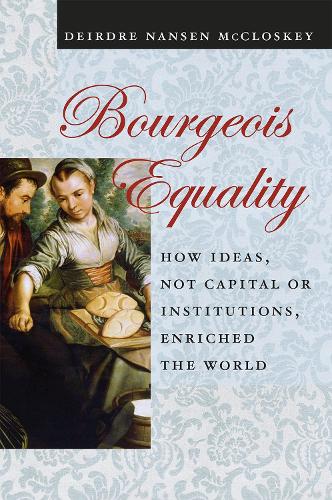Bourgeois Equality
Bourgeois Equality
Regular price
Checking stock...
Regular price
Checking stock...
World of Books
At World of Books, you’ll find millions of preloved reads at great prices, from bestsellers to hidden gems. Every book you buy saves money and helps reduce waste, so you can read more for less while giving stories a second life.
The feel-good place to buy books
- Free US shipping over $15
- Buying preloved emits 41% less CO2 than new
- Millions of affordable books
- Give your books a new home - sell them back to us!

Bourgeois Equality by Deirdre N Mccloskey
There's little doubt that most humans today are better off than their forebears. Stunningly so, the economist and historian Deirdre McCloskey argues in the concluding volume of her trilogy celebrating the oft-derided virtues of the bourgeoisie. The poorest of humanity, McCloskey shows, will soon be joining the comparative riches of Japan and Sweden and Botswana. Why? Most economists from Adam Smith and Karl Marx to Thomas Piketty say the Great Enrichment since 1800 came from accumulated capital. McCloskey disagrees, fiercely. "Our riches," she argues, "were made not by piling brick on brick, bank balance on bank balance, but by piling idea on idea." Capital was necessary, but so was the presence of oxygen. It was ideas, not matter, that drove "trade-tested betterment." Nor were institutions the drivers. The World Bank orthodoxy of "add institutions and stir" doesn't work, and didn't. McCloskey builds a powerful case for the initiating role of ideas ideas for electric motors and free elections, of course, but more deeply the bizarre and liberal ideas of equal liberty and dignity for ordinary folk. Liberalism arose from theological and political revolutions in northwest Europe, yielding a unique respect for betterment and its practitioners, and upending ancient hierarchies. Commoners were encouraged to have a go, and the bourgeoisie took up the Bourgeois Deal, and we were all enriched. Few economists or historians write like McCloskey her ability to invest the facts of economic history with the urgency of a novel, or of a leading case at law, is unmatched. She summarizes modern economics and modern economic history with verve and lucidity, yet sees through to the really big scientific conclusion. Not matter, but ideas. Big books don't come any more ambitious, or captivating, than Bourgeois Equality.
Deirdre Nansen McCloskey is an emerita distinguished professor of economics and of history, and professor of English and of communications at the University of Illinois at Chicago. She is the author of sixteen other books, including If You're So Smart, The Secret Sins of Economics, The Bourgeois Virtues, Bourgeois Dignity, and Crossing: A Memoir, all published by the University of Chicago Press.
| SKU | Unavailable |
| ISBN 13 | 9780226527932 |
| ISBN 10 | 022652793X |
| Title | Bourgeois Equality |
| Author | Deirdre N Mccloskey |
| Condition | Unavailable |
| Binding Type | Paperback |
| Publisher | The University of Chicago Press |
| Year published | 2017-10-13 |
| Number of pages | 768 |
| Cover note | Book picture is for illustrative purposes only, actual binding, cover or edition may vary. |
| Note | Unavailable |
